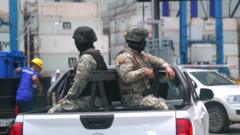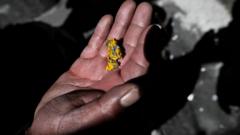As Ecuador emerges as a key player in the global cocaine trade, with a significant increase in illicit drug exports to Europe, the article highlights the complexities of trafficking routes, the role of organized crime, and the responsibilities of consumer nations contributing to the crisis.
A Deep Dive into Ecuador's Cocaine Trade: Routes to Europe and Rising Demand

A Deep Dive into Ecuador's Cocaine Trade: Routes to Europe and Rising Demand
The article explores how Ecuador has become a crucial transit point for cocaine to Europe, driven by rising consumption and gang violence.
Ecuador has increasingly become a focal point for cocaine trafficking, linking South American producers with a growing European market. Despite not producing cocaine itself, an alarming statistic reveals that 70% of the world's cocaine now moves through Ecuadorian ports, according to President Daniel Noboa. The surge in activity is largely attributed to the Albanian mafia, which has solidified its presence in the country by exploiting its port infrastructure and establishing illicit trade networks.
César, a member of the Latin Kings gang, describes the violence linked with the drug trade, noting that refusing to cooperate with the Albanian mafia could lead to death. He highlights the ruthless methods employed to smuggle cocaine into Europe, including hiding it in shipping containers and preserving a façade of legitimate exports, such as the booming banana industry. This industry, which represents a major portion of Ecuador's exports, inadvertently serves as a cover for drug shipments.
Ecuador has seen a troubling rise in violence directly associated with the cocaine trade, with January 2025 marking the deadliest month in recent history—781 murders attributed largely to turf wars among gangs. As more Ecuadoreans fall victim to gang recruitment, the link between economic despair and rising drug trafficking cannot be ignored.
Truck drivers like Juan unknowingly participate in this illicit trade, bringing to light the dangers they face, including violent repercussions from gangs. The growing demand for cocaine in consumer countries, especially in the UK and other European nations, fuels this cycle of violence and desperation. The UK alone consumes approximately 117 tonnes of cocaine annually, making it a lucrative target for organized crime, which profits massively from the high demand.
Experts, including legal professionals and police officers, stress that any efforts to tackle the drug trade must address the demand side in consumer nations. The impact on local economies in Ecuador is profound, with banana exporters facing stigma and potential economic decline amid rising violence linked to illicit activities.
As President Noboa prepares for a competitive election, the fight against organized crime remains his priority, with an explicit message to consumer nations that their habits contribute to the chaos seen in producer countries. The interconnectedness of global drug trafficking underscores the challenges faced by nations like Ecuador, where the consequences of drug consumption extend far beyond their borders, affecting lives and economies in ways that require global cooperation and action.



















